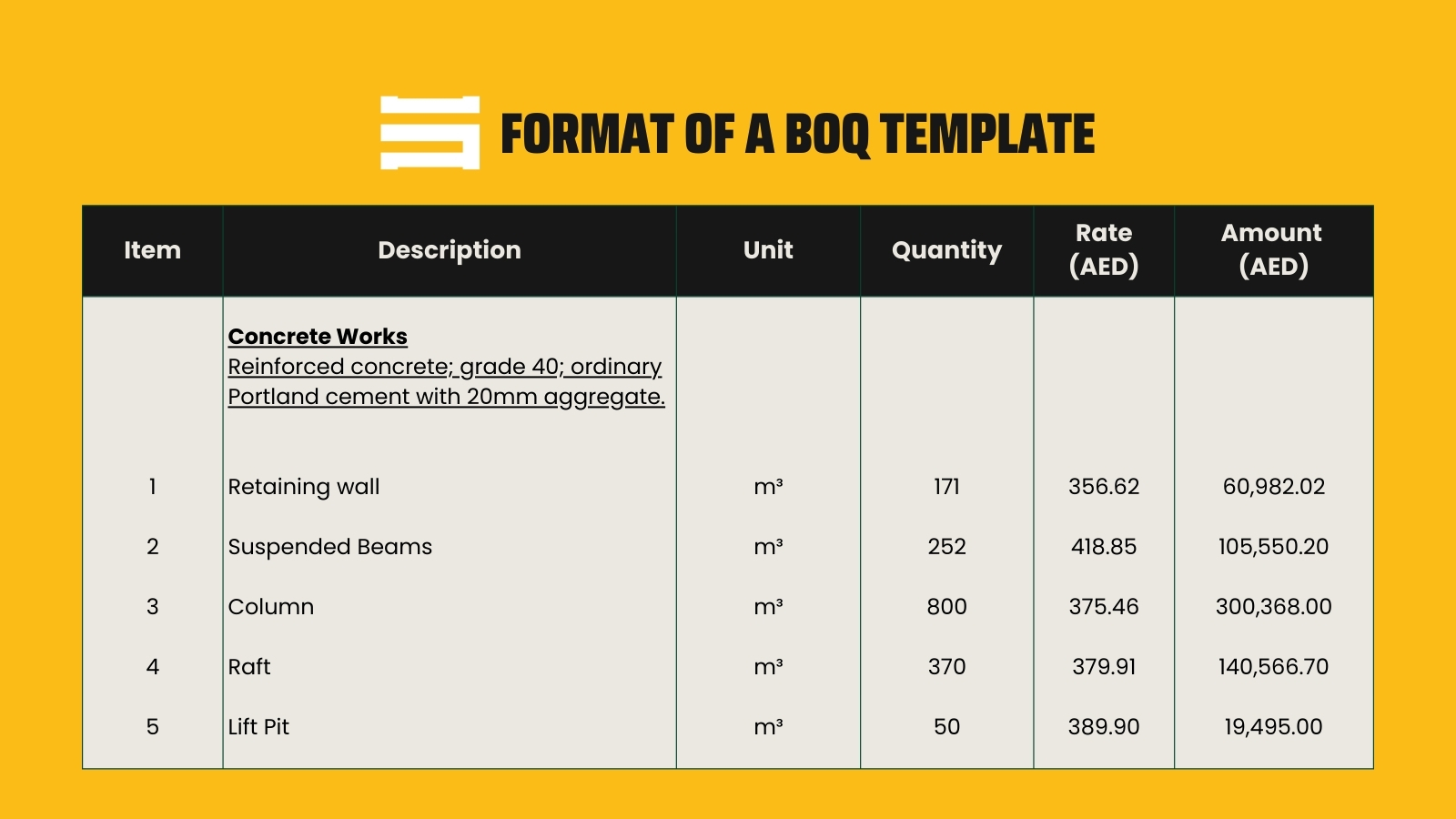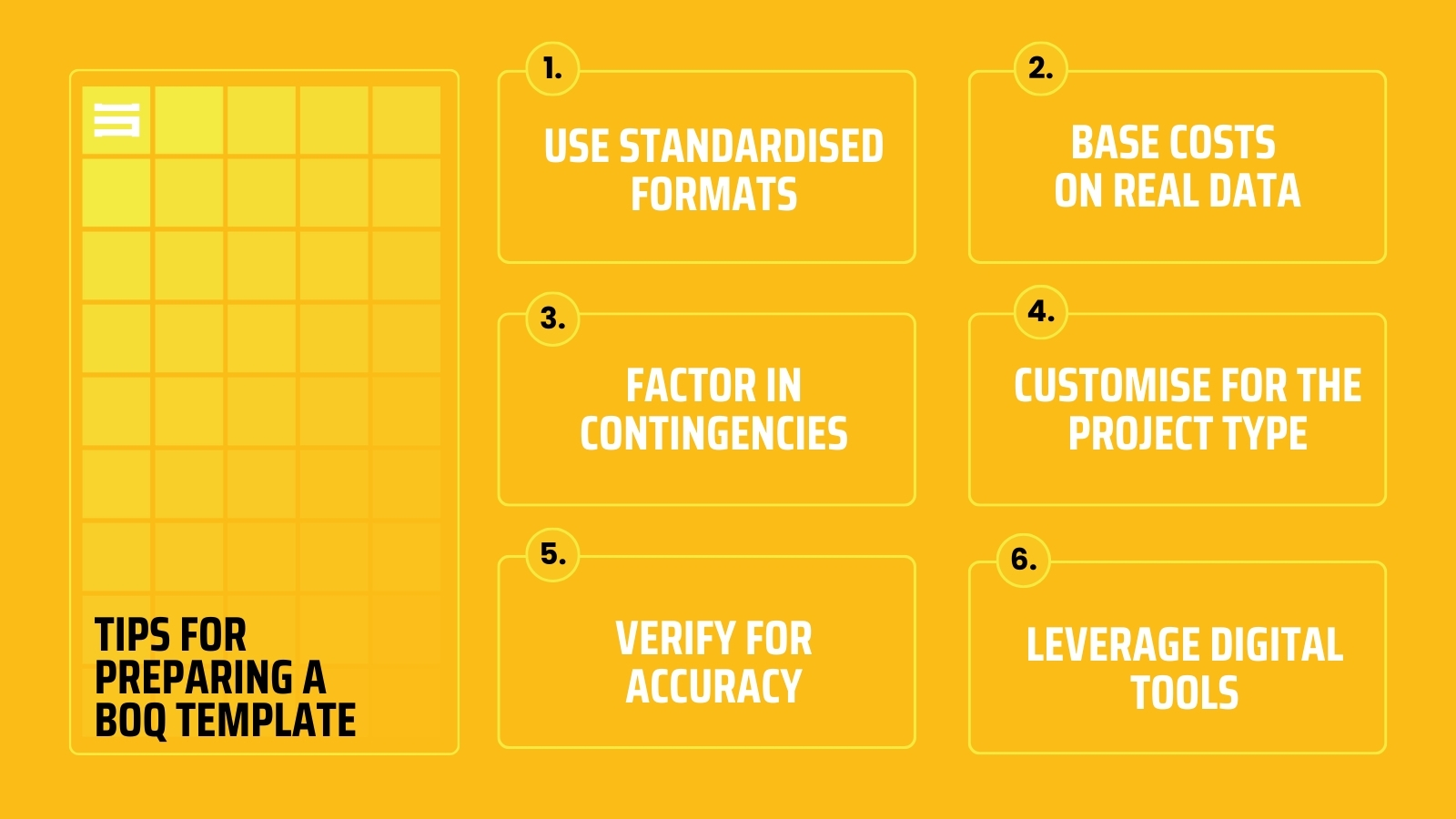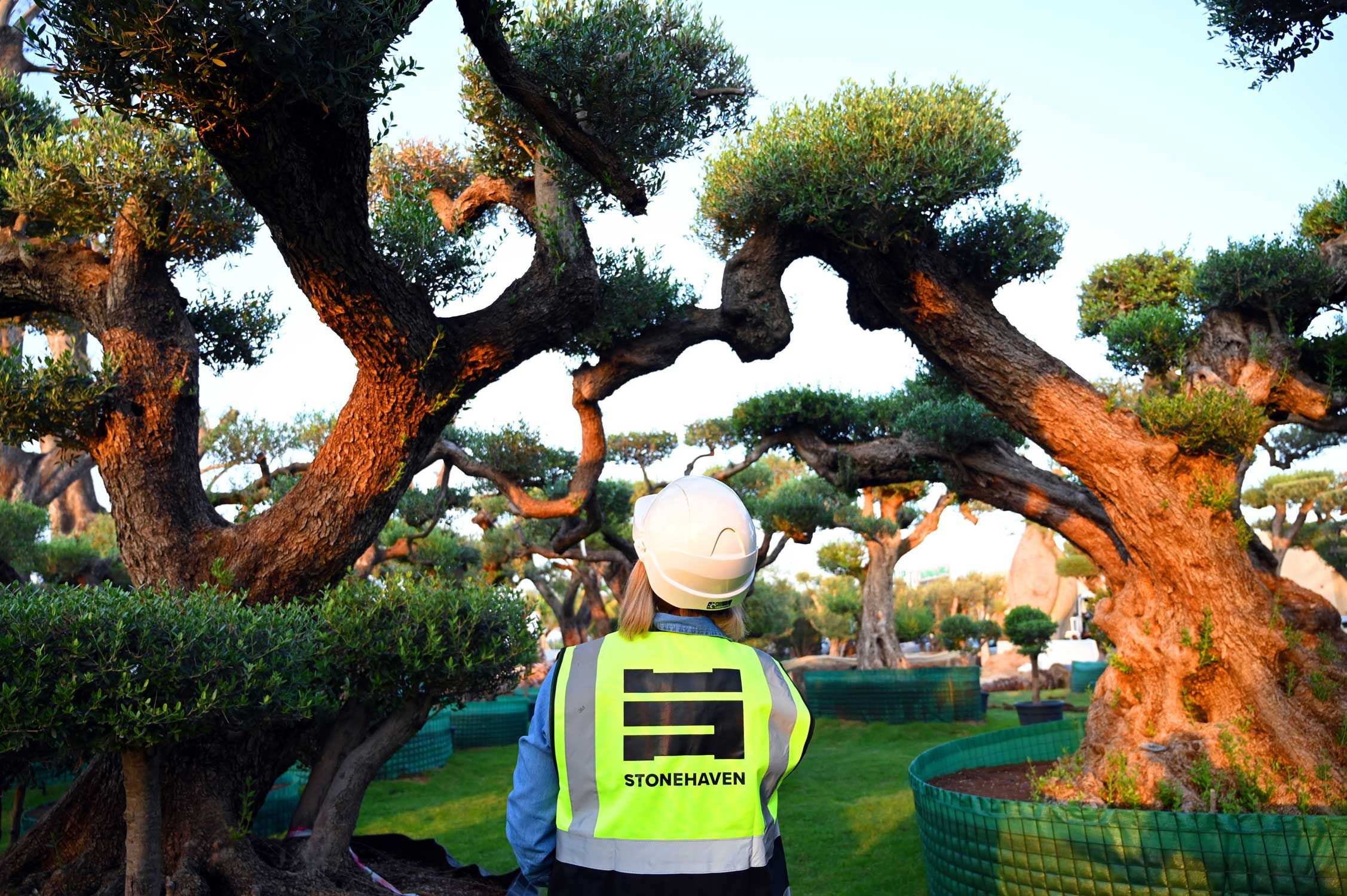In construction, where precision and planning dictate success, managing project costs effectively is essential. Nowhere is this more apparent than in the Middle East—a region renowned for its rapid urbanisation, iconic architectural marvels, and large-scale infrastructure projects. Here, where billion-dirham developments rise, the Bill of Quantities (BOQ) is more than just a document—it holds up project financial management.
Without a BOQ, a project can spiral with cost overruns, miscommunications, and delays that can derail even the most ambitious vision. Whether you’re overseeing a luxury high-rise in Dubai, a commercial hub in Riyadh, or a residential villa in Abu Dhabi, a BOQ acts as your guide to financial clarity.
But what is a BOQ exactly, and how can it meet the unique demands of construction projects in the Middle East? This guide will walk you through everything you need to know. From its definition and benefits to practical calculations and scenarios, we’ll explore how BOQs can streamline project execution across different sectors. We’ll also highlight the critical role of quantity surveyors and expert services in ensuring accuracy and efficiency in this fast-paced market.
What is a Bill of Quantities (BOQ) Template?
At its core, a Bill of Quantities (BOQ) is a structured document that is used to list and price every material, service, and labour task required for a construction project. Think of it as a financial blueprint that aligns contractors, clients, and consultants around a shared understanding of project costs.
A BOQ template standardises this process. It’s particularly valuable in the Middle East, where the scale and complexity of construction projects demand precision and consistency. From mega-developments like Expo City to infrastructure developments, a BOQ template ensures that everyone—whether it's a local contractor or an international developer—operates on the same financial framework. The below is a sample BOQ template (contents tend to vary based on project works).

General Columns in a BOQ Template
- Description: A breakdown of materials, tasks, or services.
- Unit of Measurement: Metrics such as square metres, tonnes, or linear metre, etc.
- Quantity: The measured amount of a particular item of work or material required for said project.
- Unit Rate: Cost per unit that usually includes material, labour and plant costs. (based on local or regional market prices).
- Amount: The final price for each line item (quantity x unit rate).
For instance, a BOQ for residential buildings may include items like “concrete foundations,” measured in cubic metres, with unit rates based on Dubai’s construction market prices. The result? A document that eliminates guesswork, simplifies tendering, and aligns everyone with a clear, itemised financial plan.
Why Should You Use a BOQ Template?
In the Middle East’s dynamic construction market, where efficiency and accuracy are non-negotiable, the BOQ template is a game-changer. Here’s why:
1. Correct Budgeting for High-Stakes Projects
The Middle East is home to some of the world’s most expensive developments. A BOQ ensures budgets are realistic and comprehensive, avoiding surprises during execution.
2. Improved Collaboration Across Multinational Teams
Large-scale Middle Eastern projects often involve diverse stakeholders—local contractors, international engineering firms, and government agencies. A BOQ provides a shared language for cost transparency, fostering collaboration.
3. Simplifies Tendering in Competitive Markets
The construction industry in the region is brutally competitive. A standardised BOQ template helps clients compare tender submissions easily, ensuring the most cost-effective and qualified contractor is selected.
4. Saves Time Amid Tight Deadlines
With projects like stadiums delivered under strict deadlines, time is money. A BOQ template saves precious time by providing a ready-made structure for cost estimation.
5. Reduces Financial Risks in Complex Developments
Middle Eastern projects are often ambitious, combining cutting-edge designs with intricate engineering. A BOQ anticipates potential risks, offering a contingency fund to absorb unexpected costs.
6. Supports Resource Planning Across Multiple Sites
For firms managing several sites, such as industrial plants in Abu Dhabi or mixed-use developments in Riyadh, a BOQ ensures consistency in material allocation and cost tracking across projects.
By embracing BOQ templates, construction professionals in the Middle East can turn cost challenges into opportunities for innovation and efficiency.
Tips for Preparing a BOQ Template

A well-prepared Bill of Quantities (BOQ) template is the backbone of accurate cost estimation and budget control in construction. Whether you’re working on a luxury villa in Dubai or a major infrastructure project in Riyadh, these key tips will help you create a BOQ that enhances efficiency and transparency.
1. Use a Standardised Format
Keep your BOQ structured with clear columns: Item Description, Unit of Measurement, Quantity, Unit Rate, and Total Cost. This ensures consistency and easy comparison during tendering.
2. Base Costs on Real and Latest Data
Ensure all quantities are taken from precise project drawings. Use up-to-date market prices for materials and labour, considering regional variations in the Middle East.
3. Factor in Contingencies
Unexpected costs are inevitable. Include a 5–10% contingency fund and account for overheads like permits and logistics to prevent budget overruns.
4. Customise for the Project Type
Every project is different. A residential BOQ will focus on finishes and MEP systems, while infrastructure BOQs prioritise large-scale materials like concrete and asphalt.
5. Verify for Accuracy
Cross-check calculations, compare with contract documents, and have an expert review the BOQ before finalisation to avoid costly mistakes.
6. Leverage Digital Tools
Using Excel, BOQ software like CostX or PlanSwift, or integrate with BIM models to improve accuracy and efficiency.
Case Study for BOQs
Restaurant projects in the UAE and KSA often demand highly tailored Bills of Quantities (BOQs) to address diverse requirements, such as intricate designs, premium-quality finishes, and cutting-edge technology integrations. Stonehaven’s expertise in this area ensures that BOQs serve as essential tools for cost optimisation without compromising on quality or project goals.

For most of our restaurant projects, we offer comprehensive BOQ development and pre-contract cost management services. The scope includes detailed breakdowns for various work components, such as:
Design Phase
-
Architecture & Facade: Encompassing external design elements and structural finishes.
-
Mechanical, Electrical & Plumbing (MEP): Covering all building services installations.
-
Interior & Furniture: Detailing layouts, furniture selections, and fit outs.
-
IT/AV Systems: Specifying advanced technological requirements.
-
Lighting: Addressing ambiance and functional lighting needs.
-
Signage & Wayfinding: Ensuring clear and aesthetically pleasing navigation aids.
-
Regulatory Approvals: Managing documentation and compliance for construction approvals.
Construction Phase
-
Demolition and Disposal: Ground and mezzanine-level removal, ensuring proper waste management and site preparation.
-
Structural Modifications: Ground Floor which included reinforcement and waterproofing and mezzanine-levels: factoring in all structural and finishing details.
Who Uses BOQ Templates?
A Bill of Quantities (BOQ) template isn’t just a document; it’s a critical tool relied upon by various professionals across the construction industry. Whether you’re a consultant quantity surveyor overseeing cost management, a contractor pricing bids, or a client ensuring accountability, BOQs provide the clarity and structure needed to manage complex projects—particularly in the Middle East, where construction often operates on an impressive scale.
Here’s a closer look at how different stakeholders use BOQ templates to achieve their goals:
1. Quantity Surveyors: Precision Meets Expertise
For quantity surveyors, a BOQ template is the foundation of their work. These specialists are responsible for ensuring project costs are planned accurately and aligned with real-world market conditions. Their expertise is critical in the Middle East, where material and labour costs can fluctuate based on regional factors like import tariffs, supply chain challenges, or local wage trends.
For example, let’s say a developer in Abu Dhabi is planning a luxury residential complex. The consultant quantity surveyor uses a BOQ template to break down the project’s requirements into detailed cost estimates, accounting for materials, labour, and potential risks. From the cubic metres of concrete needed for the foundations to the imported tiles for the interiors, every line item is measured and costed.
Additionally, BOQs are essential during the tendering process. They provide a standardised format for contractors to submit their bids, allowing developers to compare pricing fairly and transparently. By using tools like bill of quantities samples or region-specific building construction bill of quantities formats, quantity surveyors ensure the document is easy to follow, reducing errors and discrepancies.
2. Contractors: Turning BOQs into Action Plans
For contractors, the BOQ is a blueprint for success. It gives them the clarity they need to price their bids competitively and avoid the financial pitfalls that can arise from inaccurate estimates.
Take, for instance, a mid-size contractor bidding for a villa in Muscat. By using a BOQ for residential buildings created on Excel, the contractor can calculate precise costs for every component—structural work, electrical systems, finishes, and landscaping. Without a BOQ, there’s a risk of underestimating the scope of work, leading to financial strain during execution.
For Tier 1 contractors in the UAE working on large-scale projects—think luxury hotels or mixed-use developments—BOQs are even more critical. These firms deal with multimillion-dirham projects where accuracy isn’t an option; it’s essential. A detailed BOQ ensures their bids are well-structured, competitive, and transparent, increasing their chances of winning contracts while keeping profitability intact.
3. Clients and Developers: Transparency and Accountability
For clients and developers, the BOQ is all about ensuring their investments are managed responsibly. When dealing with projects of any scale, from a private villa to a sprawling urban development like NEOM in Saudi Arabia, a BOQ provides clarity on exactly where money is being spent.
In government-funded projects or public-private partnerships, BOQs are often mandatory to ensure compliance and accountability. They allow developers to monitor spending against budgets and avoid the dreaded “cost creep” that can occur in long-term projects. Additionally, BOQs provide a basis for negotiations—whether it’s securing better material pricing from suppliers or adjusting scope with contractors.
For private clients, a BOQ adds peace of mind. For example, a homeowner in Dubai looking to build a luxury villa can refer to the BOQ to ensure they’re not overpaying for materials or labour. The transparency offered by the BOQ empowers clients to stay informed, make better decisions, and remain confident throughout the project.
Conclusion
In a region where innovation meets ambition, the Bill of Quantities (BOQ) is a critical tool for achieving construction excellence. From cost clarity to risk management, a well-prepared BOQ ensures that projects—whether they’re skyscrapers in Dubai or smart cities in Saudi Arabia—stay on track and within budget.
For the best results, turn to experienced professionals like Stonehaven, who understand and meet the unique demands of the Middle Eastern market.
About us
At Stonehaven, we provide expert Bill of Quantities services tailored for your construction projects. With a team of seasoned consultant quantity surveyors, we specialise in preparing accurate BOQs for projects of all sizes—from residential villas to multimillion-dollar developments.
Learn how we can help you streamline your project costs, reduce risks, and achieve success in your next construction project.

















